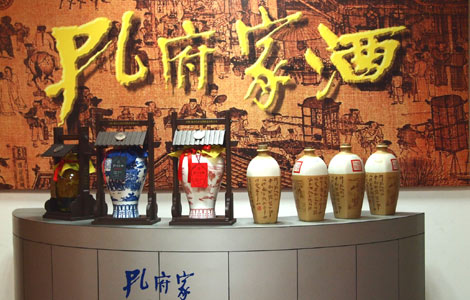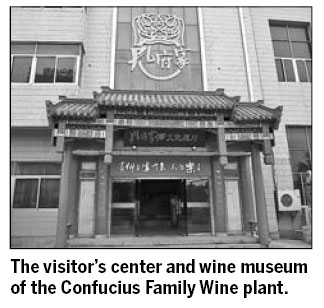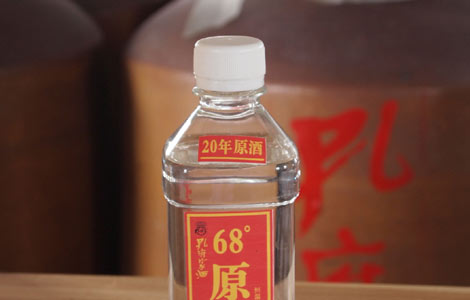Delicacies
Wine with manners
Updated: 2011-08-14 07:48
By Pauline D Loh (China Daily)
|
 After fermentation, distillation and storage, cereals are brewed into strong and fragrant Confucius Family Wines. Pauline D Loh / China Daily |
More than 2,000 years ago, Confucius taught his disciples that wine must be treated with respect. Pauline D Loh finds out more at the brewery that helps propagate the proper manners and rituals in Qufu.
It took several persistent tries before we were granted our request. It was the wrong season, we were told, but we were truly reluctant to leave Qufu without visiting the Confucius Family Wine Brewery.
We finally got the permission to visit hours before we were to leave.
The brewery is in a suburb of Qufu and the complex is a sprawling block spread out beside a four-lane expressway. We found out later the highway actually dissected the original plant, and now separates the administrative building, the museum, visitor center and the bottling plant from the fermentation sheds and storage cellars on the other side.
The factory's product quality director Zhang Hongqi led us across the road down a lane where we stopped before a low block. This was where his brewery workers lived on the upper floors.
Once through a tiny doorway, we discovered the ground floor had been knocked through to form one huge storage level that stretched out the whole length of three blocks.
There were neat rectangles on the ground covered with what looked like cotton quilts. These hid two-meter deep pits where a mash of cereals slowly fermented in the first stage of production. The mix is made from five main cereals - sorghum, wheat, peas, corn and barley - that is first steamed, then fermented for about 12 months.
The next step is distillation, a complicated process that will ultimately decide how strong and how fragrant the final liquor will be. A second distillation concentrates the alcohol content, which can go to as high as 68 proof.
 |
Confucius Family Wine is then stored in huge earthen jars that can hold up to 500 kg of liquor each. The urns are stored in neat rows, all carefully marked. It is from these vats that the spirit base will be tapped and brewed into various strengths and flavors.
At the cellar, we were given a rare vintage to sample: A 20-year old spirit that was 68 proof. It went down the gullet like firewater, yet left an aromatic aftertaste in the mouth seared clean by the alcohol.
This is a particular characteristic of the "aromatic liquor" which retains fragrance in its bouquet, mouth feel and after taste.
Back at the tasting center and museum, visitors can see how wine has always been an integral part of rituals and rites throughout the ages, and showed how Confucius educated his disciples to accord the spirit its proper respect in moderate intake, appreciation and cultural heritage.
This local brewery has a long history. Although there was initial confusion over the name and the pedigree, there is no more doubt about the real thing.
The factory was set up in 1958 by the Shandong provincial government to continue the heritage of winemaking that has been in the Confucius family for more than 2,000 years.
Much research and development went into the original recipe, and now there are several brands of the spirit ranging from an up-market label costing several thousands each bottle to affordable brews for the common man and several more categories in between.
All have the characteristic fragrance that infuses the white spirit named after the Great Sage.
"There is no ritual without wine," said Confucius, and indeed, the white spirit from his family is never absent from the equally famed Confucius family banquet, which is a cuisine category by itself.
But that is another story, for another day, so stay with us.
You may contact the writer at paulined@chinadaily.com.cn.
|
 The 20-year-old spirit of 68 proof has an aromatic aftertaste. |

Specials

Star journalist leaves legacy
Li Xing, China Daily's assistant editor-in-chief and veteran columnist, died of a cerebral hemorrhage on Aug 7 in Washington DC, US.

Robots seen as employer-friendly
Robots are not new to industrial manufacturing. They have been in use since the 1960s.

Smurfs up in China
The movie remake of a classic 1980s cartoon series is expected to have special cross-generation appeal to Chinese filmgoers